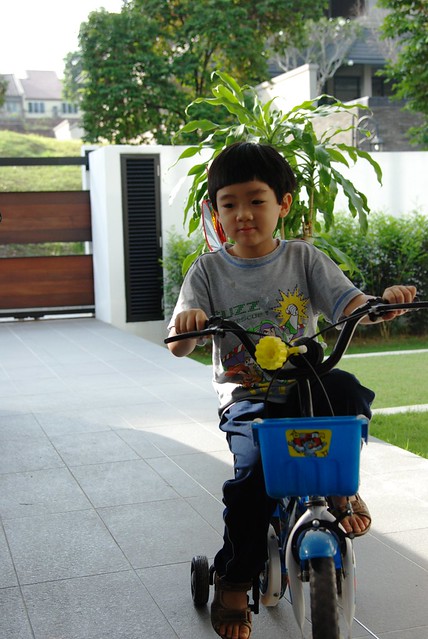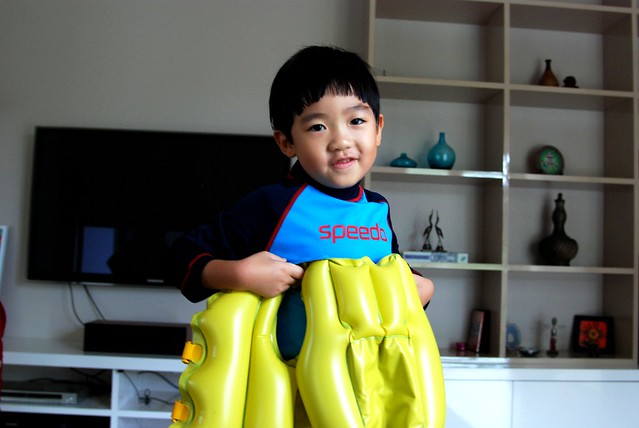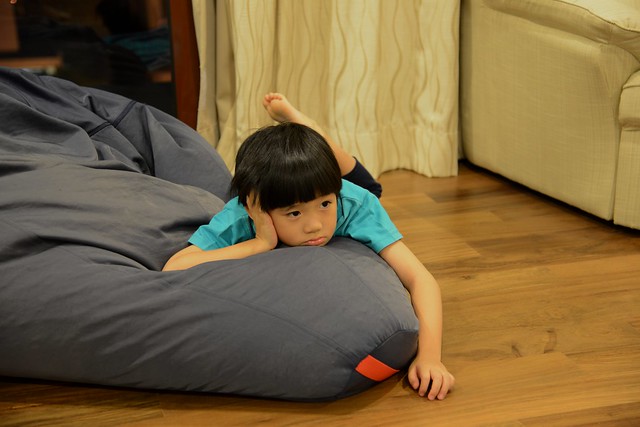Jeremy celebrated his 6th birthday with relative quietness and privacy. Much of the celebrations happened in the pre-school premise. I must say he has developed rapidly over the past one year in terms of physical and mental well being.
Here are some of the expected developments for a 6 year old:
- Six-year-olds have longer attention spans and continue to prefer structured activities to more open-ended experiences. They enjoy taking on new roles and responsibilities, but still require much direction from adults and frequently ask questions to ensure that they are completing tasks the right way.BRAIN : I must say Jeremy does have longer attention span. He can watched and complete a movie without disruption (if he likes the show). However, he does not necessarily ask questions to ensure he is 'completing tasks' the right way. An example, is that he does not always follow the coach's instructions during swimming lessons!
- The language skills of six-year-olds become increasingly sophisticated throughout the year. Their vocabularies rapidly increase, and their language moves beyond communication to provide a foundation for learning, including the development of independent reading skills. In general, their pronunciation of words is clear and they use complex grammatical forms accurately.BRAIN : Jeremy seems to be good in language skills. English is strong in him and based on the teacher's feedback, he has demonstrated strong affiliation for the Mandarin language, although he mentioned that he would not speak in Mandarin at home as its for school only ! What a reason to give !. I really hope he can pick up dialect as well like Hokkien so that he can appreciate his heritage better in future. That would be one of my 2013 resolution!
- In first grade, children transform into true readers. They apply their knowledge of how print works and practice strategies to decode unfamiliar words. They learn to read aloud with fluency, accuracy and understanding. They read a variety of texts for pleasure (e.g., stories, informational texts, poems) and draw upon a variety of comprehension strategies to understand and enjoy texts. Children this age write stories, notes and descriptions. Most are able to develop an idea beyond a sentence and will add some details to help describe or explain things in their world. They enjoy sharing their writing with others.BRAIN : Reading again is not a problem for him. Jeremy seems to have developed interest in reading books to acquire knowledge. We were initially concerned with his reading skills at the beginning of the year, but thanks to my in-laws whom have actually put him on a 'grilling' program and since then reading skills have improved tremendously.
- In mathematics, six-year-olds can typically count up to "200" and count backwards from "20." They understand the concept of "odd" and "even" numbers and can represent numbers on a number line or with written words. They use increasingly more sophisticated strategies to solve addition and subtraction problems. They also count the sides of shapes to identify them and can combine shapes to create a new one. Six-year-olds can also give and follow directions for moving around a room or on a map.BRAIN : An Achilles Heel for little Jeremy. Despite putting him in Kumon classes, he seems easily distracted when dealing with math. An area to watch indeed.
- Scientific discovery for children this age is affected by their tendency to straddle the world between make-believe and reality. Six-year-olds might continue to give animals human characteristics, such as suggesting what a worm might be thinking, or that a butterfly has eye lashes. Gentle encouragement to look closely at worms and butterflies will help children to describe more objectively what they observe. Science experiences for this age group should continue to immerse children in first-hand investigation of the world around them, so they can continue to build a reservoir of experiences from which they can begin to draw as their thinking becomes more sophisticated.BRAIN : He has developed curiosity in this area. He enjoys listening to grandpa on how rainbow is formed, how onions and trees can grow or how caterpillars can develop into beautiful butterflies.
- Six-year-olds continue to enjoy moving in a variety of ways. Although far from proficient in motor skills, this does little to dampen their enthusiasm for trying out new activities and sports. They are able to run in various pathways and directions and can manipulate their bodies by jumping and landing, rolling and transferring their weight from feet to hands to feet. Their hand- and foot-eye coordination is still developing, so skills like throwing, catching, kicking and striking are still emerging. With the right equipment, however, and a skillful partner, their motor skills continue to improve. Note: During this period of development, children's actual skill levels will vary based on their amount of physical activity. Sedentary children will not mature as quickly as those who participate in activities like dance lessons, team sports or backyard play.BRAIN : Swimming is the flavour of the year for Jeremy. Since full training a couple of months back. Now he can float and swim fairly well save for some improvement in strokes.




No comments:
Post a Comment